A DS on the British race scene in the 80’s and 90’s? Easy life – cool team padded jacket, smart team car to drive, the soigneur prepares your packed lunch every day whilst the sponsors are throwing money at you… Well, maybe that last bit needs clarifying; Keith Lambert seemed like a good man to ask.
Your managerial career started as ‘player/manager’ with Watertech-Dawes in 1987?
“Yes, it was suggested to me and I thought; ‘why not ?’ it would be a bit more work but give me an insight into that side of the sport.
“But I moved into full time management earlier than I anticipated.
“I was riding a criterium in Cork on what was a very technical circuit with a lot of corners; I was away with Stephen Roche, that was the year of his famous Giro, Tour, Worlds ‘treble’ and I was thinking; ‘I can win this !’ but we were caught on the last lap.
“Kelly came up like a rocket and there was obviously an arrangement between him and Roche – who was still up front because we’d just been caught – and Roche ‘shut the door’ just as Mark Walsham kicked, Walsham went down, there was a mass crash and I think Kelly had a lone win because there was total mayhem behind him.
“I broke all sorts, I had been going to ride the Nissan but that crash brought my career to a premature close.”
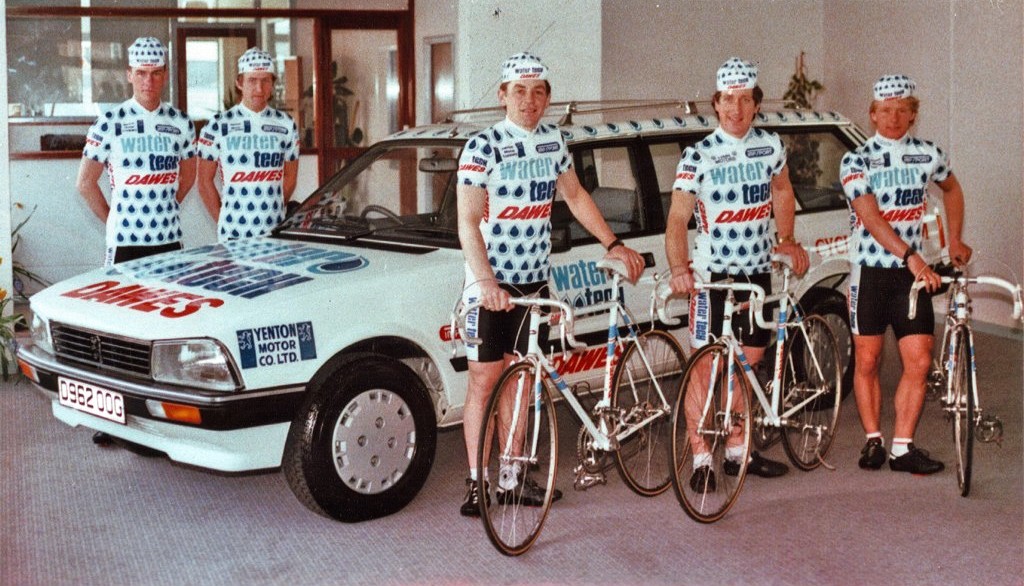
Then full time managerial with PMS Dawes in ’88?
“PMS came in late, I had the connection with Dawes so we were sorted for bikes but the big teams like Bilton and Raleigh had snapped up the top guys.
“But there were still some good guys available and we were a solid team.
“As now, where the UK domestic teams have to compete to see who gets the ride in the Tour of Britain, it was the same back then with competition to see who got the Milk Race ride – we won our place and Steve Jones took third overall behind the Russian, Zhadanov.
“That was also the year where Daryl Webster won the Nissan stage, which had a lot to do with him getting the ride with Teka.
“The main man at PMS was so pleased with how that year went that he bought all the riders a car each – little Fiats.
“Then in ’89 we had the Sutton brothers and Keith Reynolds – he was second in the Milk Race, only losing it to Brian Walton of Canada late in the day.”
Then Banana came in for 1990?
“Just like when you turn pro, you have to prove yourself as a manager – when I was a rider I felt that a lot of time we were left to get on with it, there was no real structure and I wanted to be better than that.
“At PMS we didn’t have the top guys but we rode as a team and were successful, that process started in the winter where I got all the lads up to my house and began the process of bonding them.
“I learned an awful lot in those first years and Banana was a step up, a big sponsor.
“The team had been Raleigh-Banana the year before but Raleigh were dithering a bit and Paul Sherwen couldn’t be reached because he was in Africa so Banana contacted me, I brought in Falcon and we had a very successful year.
“We started it in fine style with Keith Reynolds winning Stage One of the Tour of the Americas.
“We rode the Vuelta a Murcia where Dave Rayner got seventh overall and we were down in Reggio Calabria too.
“Dave became a target for the big teams with Clas expressing interest but I knew that Jan Raas was keen to sign him so I got in touch with him and Harry Jansens came over and signed David up.
“When Falcon dropped out we had MET helmets come in but then we lost Banana…
“Banana loved the team, it was a great marketing vehicle for them but as a group advertising a product rather than individual companies like Fyffes or Geest, and they fell foul of EU legislation and had to pull out.”
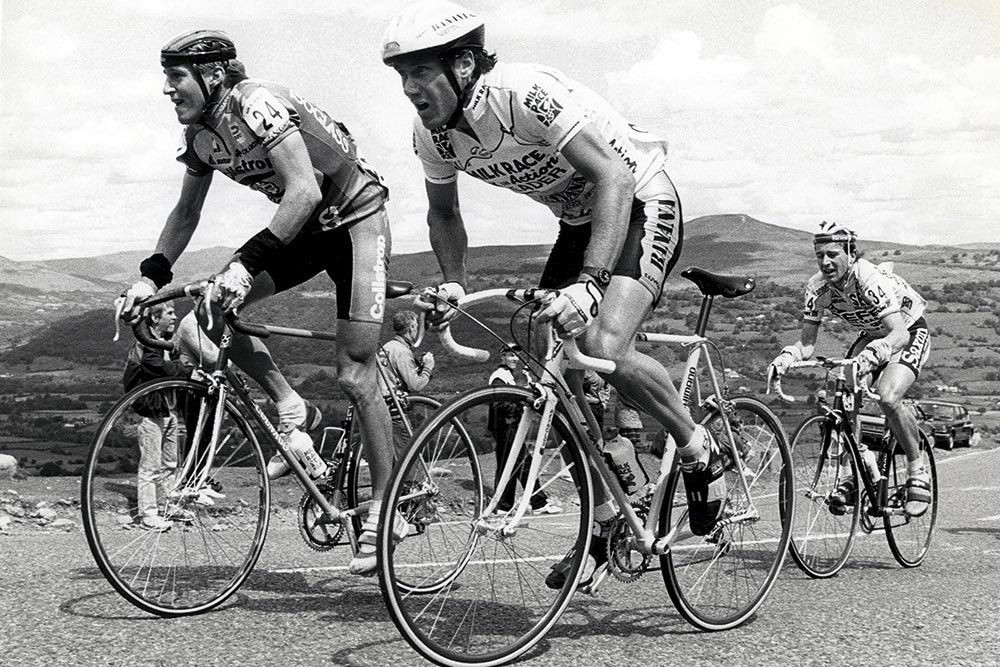
Then it was Foremost Contract Furnishers with the controversial Scot Eddie Cairney?
“Yes, that was ’94 after the Banana deal collapsed; Cairney said he would take it on.
“The deal was done on a handshake, he seemed like a nice, genuine guy – but it just didn’t work out that way and we all lost money with that one…”
Peugeot for 1995?
“That was a sorry time for UK cycling, in the 80’s we had the Kellogg’s Tour and their city centre crits and there was the Scottish Provident series but we lost them all.
“But British domestic cycling has always been that way, a roller coaster.
“Eddie Ecklestone who was the MD at Falcon joined Peugeot and offered to supply the bikes, and so we had a little team with Shane Sutton, Neil Hoban and Chris Walker.
“Then we got Gill Airways in to give us more backing but like I said, it was a difficult time for the home pros.”
Brite in 1998 was one cool looking team with those red jerseys and bikes?
“Yes, but again, there’s a story…
“The team was originally meant to be sponsored by Virgin but Richard Branson backed out and it became ‘Brite’ which was part of the Virgin group – but we didn’t realise that until the day of the launch.
“We had all of the GB team pursuit riders on board, Chris Newton, Rob Hayles, Jon Clay, Bryan Steel and Matt Illingworth.
“Ian Hallam’s brother was the man at Brite and whilst the team looked the part it was another ‘one year wonder…’”
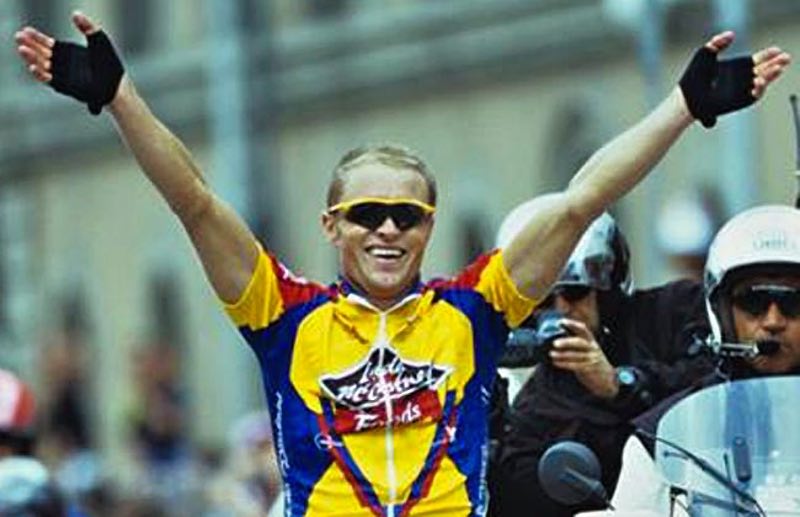
I almost hate to say it but, McCartney ’99 and 2000?
“I was assistant team manager there to Sean Yates and the first year we had a tie in with the Welsh Cycling Union with Julian Winn on board.
“The highlight of my time there was being in the car behind David McKenzie when he won that Giro stage in 2000.
“It was a nervous day, David was away all day on his own but with about an hour of riding to go we heard Eddy Mazzoleni was trying to get across on his own, he was a strong rider and the gap was coming down; he’d been third in the Tour of Lombardy the previous autumn.
“David was waning a bit so I said to him that it looked like he was going to have company so sit up, eat, drink, relax for a bit so he could respond when Mazzoleni came up.
“But then the gap started going out again, Mazzoleni had obviously blown – so I said to David; ‘right, get your head down again!’
“He’d had 12 minutes at one point and at the line it was down to 51 seconds but we had a Giro stage win.”
Were you at the infamous 2001 team launch where the team supremo, Julian Clark failed to show and the team collapsed?
“I was on my way down but Sean Yates called me on the mobile and told me not to bother – I turned round and went home!”
There’s a gap in your ‘managerial palmarès’ between 2001 and 2008, what were you up to?
“Riding me bike!
“I’d had enough of it, I lost a lot of money at McCartney.
“Julian said to me that he was experiencing cash flow problems and was struggling to pay salaries, so I said that he could pay me at the end of the season once he got things sorted out but I never saw a penny.
“Like Eddie Cairney, Julian seemed like a nice guy and you were taken in by it…”
Halfords in 2009 saw you risen like a Phoenix from the ashes?
“In 2008 Shane Sutton, who was with British Cycling by then rang me and asked me if I’d look after the ‘foreigners’ in the British Road Race Championships – David Millar, Cav, Roger Hammond and Jez Hunt.
“I agreed, it would a change and nice to do and that was me back involved to an extent.
“My daughter emigrated that year and after I had dropped her at Manchester Airport I dropped by the velodrome just for a chat; they asked me if I’d help Max Sciandri with the young British riders coming back from Italy for the Tour of Britain.
“Then going on from that the Halfords team was formed for 2009 as a vehicle for the team pursuiters; Ed Clancy, Rob Hayles and Andy Tennant as well as riders like Ian Bibby and Ian Wilkinson.”
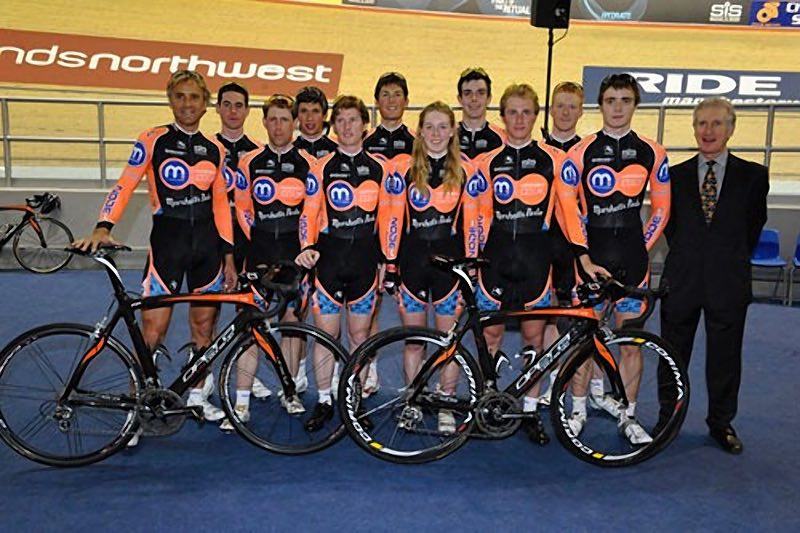
Motorpoint 2010?
“That was another British Cycling tie-in with Phil Griffiths’ team, we had Russell Downing, Ed Clancy and the team pursuit guys.
“Then in 2011 I started full time with British Cycling looking after the u23 road lads – and I’ve been there ever since.
“My last race in charge was going to be the u23 Worlds at Harrogate, ‘squaring the circle,’ I rode the Goodwood Worlds in 1982.`
“But I’m still there, I was going to be helping with Olympic preparation until the virus came along.
“But I’m in touch with riders and coaches on the phone every day.
“If you take out those years where I was out of the sport then that’s 25 years I’ve being doing this – a quarter of a century.”
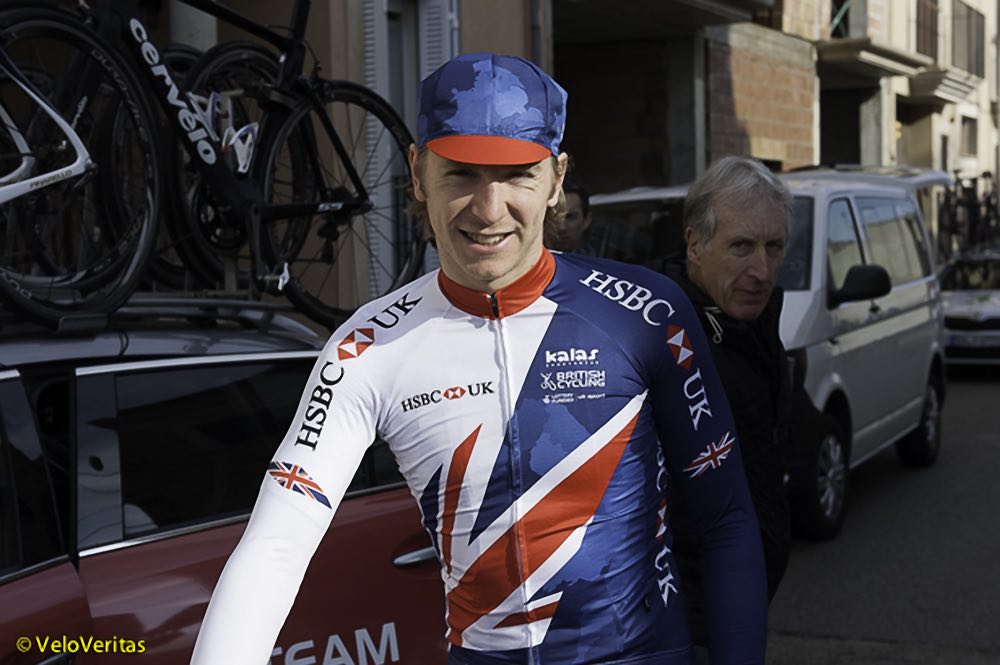
There’s not much the man hasn’t seen or done in the sport, with thanks again to Keith for his time and insights with this interview and with Part One – Three Times British Champion.



